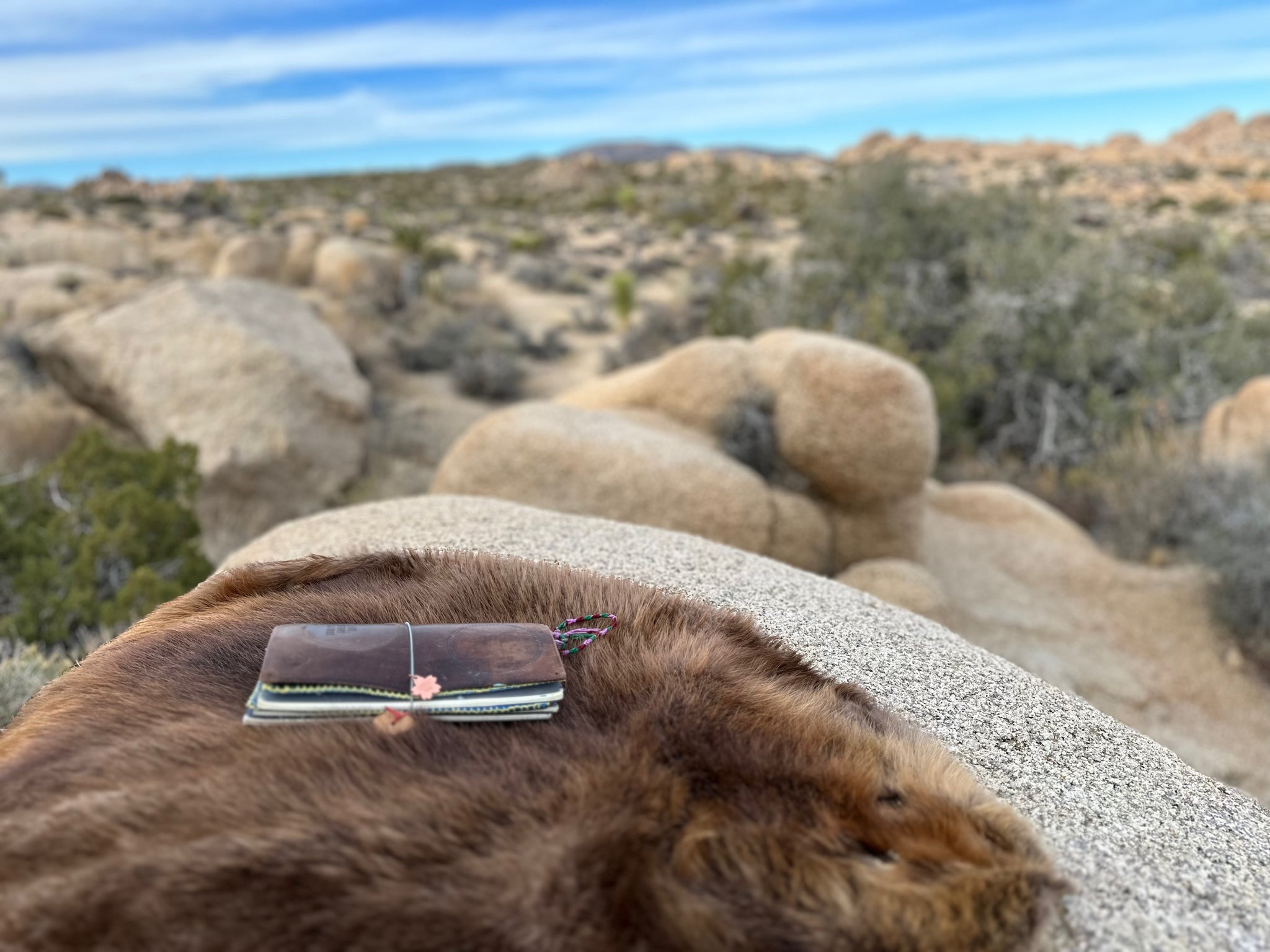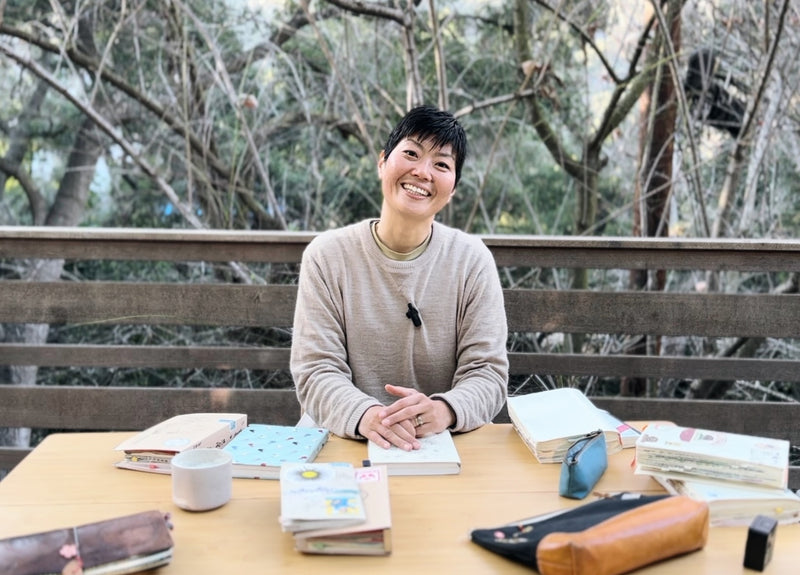Whenever I think about Wakako, I get verklempt, a little choked up and emotional. She means more to me than she will likely ever know, but hopefully she senses it. Some people come into our lives at critical times and do more good than they will ever realize they are doing at the time. A lot of times, life goes on and they will never know that they were so significant in someone else’s life. That’s Wakako for me. She, along with her family and Baum-kuchen, was a beacon of light for me. Thankfully, back in 2014 and 2015, the Universe created a number of paths in my life that led me to Wakako and her online shop, Baum-kuchen, and the community that she’d cultivated through it. Those years were particularly difficult times for me. My marriage had suddenly imploded, and I was shocked to find myself alone with my sons, struggling to keep my footing, my grounding, and my inner-strength intact. It was at that same time, via social media, that I’d learned about the Midori Traveler’s Notebook, which had something of a cult following in various Facebook groups. The timing couldn’t have been better because for as far back as I can remember, I would literally “turn over a new leaf,” whenever there was a big change in my life. Whenever new circumstances, new energy, or a new version of myself emerged, I would always feel compelled to get a new notebook.
I purchased my brown Midori Traveler’s Notebook (back before they switched to Traveler’s Company branding) from a NYC office goods shop that only carried the notebooks but not the refills; I would need to get my inserts elsewhere. That is how I found my way to Baum-kuchen, which was recommended often in those Facebook groups. From the very moment I pulled up their website, I was drawn to their aesthetic, which was calming and grounding, and inspired me to learn more about their story and mission. I found their newsletters and even the copy accompanying their products to be sources of solace. I’d return to the website time and time again, in the midst of the tumult in my life, for a bit of peace and a quick escape.
Over the months, I found my way to Wakako and Frido, who are the amazing wife and husband team that created Baum-kuchen. I began following them on Instagram, not only finding peace on their shop’s website but also from their personal social media posts, where they shared tiny glimpses of their family and home life. They exuded a simplicity and comfortable peace that both inspired me and strengthened me, as my family worked to create our new normal. I continued to feel a strong connection to BK, and in 2016 had the opportunity to start writing for them, as an analogue journal coach, which, over the years, has given me the opportunity to share my love of notebooks and love of writing.
I am so thrilled, honored, and thankful to be able to share some of Wakako’s stories with you as part of my Notebook People Project.
WAKAKO TAKAGI
It was so wonderful to have the opportunity to spend an hour talking with Wakako via Zoom. Even though we’ve worked together for years now, neither of us has yet to make it to the opposite coast to meet in person. I was all set to be at Baum-kuchen 10th anniversary celebration in 2020, but everything got turned upside down because of the pandemic. So, as of right now, the closest we have ever come to meeting face-to-face is through Zoom, which isn’t the same, but it’s better than nothing. It is always a joy when I get to interact with her, to see her beautiful, warm smile, and to experience her gentle and peaceful energy.
I always start off each Notebook People Project by talking about the questionnaire that I ask every participant to complete. The questionnaire consists of ten very basic questions, which serve as the jumping-off point for the conversations that follow. Wakako apologized for her answers, saying, “I’m so basic.” The idea of her being “basic” has continued to resonate with me since our meeting, mostly because it was accompanied by an apology when really it is the very essence of Wakako that I admire, value, and hold dear. That “basicness” is everything. That “basicness” is gold. We have come to think of the quality or characteristic of something being “basic,” as it being trite or unsophisticated. But basic also refers to that which is fundamental. “Fundamental” is defined as that which forms a necessary base or core of central importance. This philosophy or embracing of what is most important and necessary is, I think, at the very core of what I think of when I think of Wakako. She is described on the Baum-kuchen website as having “... a tender heart in understanding what makes people smile. She loves finding inspiration in everyday life and sharing her passions with everyone she loves and cares about.” These traits are very basic in an astoundingly beautiful way.
She was inspired to begin keeping a notebook when she was in college, where she studied architecture and then design. Her notebooks were where she’d sometimes sketch and jot down her ideas. Her process was simple and organic. The notebook she uses now is a brown Midori Traveler’s Notebook that she discovered in a shop, while visiting her native Japan 15 years ago. It was that notebook and her love of travel and adventure that inspired her on her journey to open Baum-kuchen. She’s been using that same brown Traveler’s Notebook ever since. Currently, it holds a calendar and one other notebook that she uses for note-taking. The cover of her notebook is well-worn, showing its 15 years of love and wear in marks, folds, stains, and scratches, which is quite symbolic of the wabi-sabi philosophy that is very much a part of her life and the mission of Baum-kuchen.

In addition to her Midori Traveler’s Notebook, she also keeps two Hobonichi planners, which she uses to write letters to her daughters, Satchi and Coco. Every day, usually in the evenings, she takes the time to write a quick note to each of them that they read in the morning when they are having their breakfast. This is a practice that she started ten years ago. I was so surprised and impressed that she’d been doing it for ten years. It wasn’t very long ago that she’d realized that she’d been doing it for ten years, and she was surprised as well. When she started the first notebook, she didn’t know that she’d still be doing it a full decade later. It was not something that she’d really considered when starting the project. Her focus was not on the end result but on the process, which is an idea and philosophy that is very important to her.

Reflecting on the process, Wakako shared that focusing on the process and not the product is part of the reason for her commitment. “I wouldn’t have been able to start if I’d thought about, like, I’m going to do this for ten years, and then I’m going to have this volume of writing for each kid at the end. That’s so much to take on.” She makes a great point. I can relate to the kind of analysis paralysis to which she was referring when she said it would have been so much to take on, as I have often over-analyzed myself into inaction. She added “...I think maybe that’s why we love the idea of wabi-sabi, too. It just focuses on accepting imperfection because we know that it’s not perfect, so why bother trying to be perfect?” Her process has evolved, and this year, she is using dated calendars instead of undated ones. The dates motivate her to write more consistently, which is something she’d like to do. However, she does not experience any stress if she finds herself too busy to write for a few days. She had just recently missed three days, and it didn’t bother her. This again harkens back to the wabi-sabi philosophy, which seems to be at the core of much that she does.

Wakako and her family have a close relationship with nature, which is part of the wabi-sabi way of life. She doesn’t just talk about wabi-sabi, but she lives it. I understand wabi-sabi as having a really close relationship with nature, and living a quiet life of rustic simplicity, in which one embraces impermanence and imperfections and flaws that are a part of the natural world. Perhaps this is part of the reason why she is content with using the same Midori Traveler’s Notebook that she discovered 15 years ago, when she has access to so many notebooks and brands on a daily basis. She remarked that she didn’t think she was always that way. “Maybe I started out really enjoying the new things. I don’t think I start out thinking, like, oh, I’m going to keep this for 20 years, and that’s who I am. When I bought it, I was like, it’s a cool system. I really like it.” But just because that’s the way she feels right now, doesn’t mean that’s how she will always feel. She added, “I don’t want to make it, like a permanent statement, but right now I’m feeling really grateful that something lasts this long and it’s still as beautiful as it was before.”

As I listened to Wakako share her thoughts and insights, I thought about nature, and the photos and videos of the canyon and ocean that she sometimes shares, and how she was so similar to nature – free, perfectly imperfect, and simple, but mostly free. Even when it comes to her analogue system, she is not rigid. For now, she has grown out of being rigid. But she stressed, “for now,” because she very much lives and thinks in the present, and is flexible. She is self-aware and knows that we all go through different seasons and life, and where we are at any given time is where we should be. It’s actually quite that simple. Being flexible is currently her way of being, and it is imperfect. In her profound words, “I love that there’s just nothing I need to put myself against to feel complete.”
She is like the ocean, basic, elemental, and free. Thank you, Wakako, for sharing your light.


I love this interview. I strive for perfect but have learned from you Trina it’s really just about writing or drawing an idea. Accepting imperfection because we know that it’s not perfect. I loved that and needed to read that. I’m so glad zoom exists. It got you to be able to interview Wakako and at least see each other face to face. So glad she has been a part of your journey Trina. So glad that you are a part of mine when I found you on IG a few years ago. Plus I’d take zoom over nothing. This was so good and refreshing. Thanks for doing these interviews. It’s motivates me to keep pushing through with writing and letting perfection in writing to be let go and to just “do it”